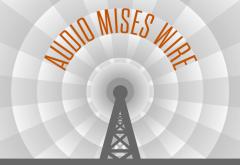Now and then, it pays to take a step back to get a broader perspective on things, to look beyond the daily financial news, to see through the short-term ups and downs in the market to find out what is really at the heart of the matter. If we do that, we will not miss the fact that we are living in the age of fiat currencies, a world in which basically everything bears their fingerprints: the economic and financial system, politics—even people’s cultural norms, values, and morals will not escape the broader consequences of fiat currencies. You may not notice it in your daily use of fiat currencies—that is, for instance, when receiving wages, buying goods and services, paying down mortgages, depositing money with the bank for saving purposes—that something is
Topics:
Thorsten Polleit considers the following as important: 6b) Mises.org, Featured, newsletter
This could be interesting, too:
Nachrichten Ticker - www.finanzen.ch writes Die Performance der Kryptowährungen in KW 9: Das hat sich bei Bitcoin, Ether & Co. getan
Nachrichten Ticker - www.finanzen.ch writes Wer verbirgt sich hinter der Ethereum-Technologie?
Martin Hartmann writes Eine Analyse nach den Lehren von Milton Friedman
Marc Chandler writes March 2025 Monthly
 Now and then, it pays to take a step back to get a broader perspective on things, to look beyond the daily financial news, to see through the short-term ups and downs in the market to find out what is really at the heart of the matter. If we do that, we will not miss the fact that we are living in the age of fiat currencies, a world in which basically everything bears their fingerprints: the economic and financial system, politics—even people’s cultural norms, values, and morals will not escape the broader consequences of fiat currencies.
Now and then, it pays to take a step back to get a broader perspective on things, to look beyond the daily financial news, to see through the short-term ups and downs in the market to find out what is really at the heart of the matter. If we do that, we will not miss the fact that we are living in the age of fiat currencies, a world in which basically everything bears their fingerprints: the economic and financial system, politics—even people’s cultural norms, values, and morals will not escape the broader consequences of fiat currencies.
You may not notice it in your daily use of fiat currencies—that is, for instance, when receiving wages, buying goods and services, paying down mortgages, depositing money with the bank for saving purposes—that something is terribly wrong with fiat currencies, be it in the form of the US dollar, the euro, the Chinese renminbi, the Japanese yen, the British pound, or the Swiss franc. However, the truth is that all these fiat currencies suffer from severe economic and ethical flaws, which are actually not difficult to understand.
Fiat currencies are produced by central banks and commercial banks’ credit expansion. In fact, central banks in cahoots with commercial banks increase the outstanding money supply by extending loans to firms, private households, and government entities. It amounts to money creation from thin air or—in a way—counterfeiting money. Issuing new fiat currencies sets into motion a boom, an illusion of prosperity. Consumption and investment expand, the economy enjoys higher corporate profits, increased employment, rising stock, housing prices, etc.
Sooner or later, the boom must turn into bust. Why? Well, the credit-based issuance of new fiat monies distorts the market interest rates. It artificially lowers the market interest rate below its “natural level,” making savings decline, consumption increase, and, on top of that, triggering additional investments. None of which would have happened in this way had it not been for the credit-based injection of new fiat money into the economic and financial system. The boom brings overconsumption and malinvestment; the economy lives beyond its means.
At some point, the boom collapses—whatever the trigger may be—banks tightening their lending standards, borrowers defaulting on their debt, firms running into losses, a geopolitical crisis making people panic. To prevent the fiat currency system from collapsing in such a situation, central banks lower interest rates even further and pump new credit and money into the financial system. The trick works more often than not, and the unfolding bust is turned into yet another boom. This, however, comes at a price: the vast majority of the people will suffer from even higher goods price inflation.
The fiat currency does not only cause financial and economic crises; it is also highly inflationary. The relentless expansion of the quantity of fiat money causes the purchasing power of the money unit to decline over time. What is more, increasing the quantity of fiat money creates winners and losers, it is not a win-win game: The early receivers of the new money benefit at the expense of the late receivers. It leads to an unjust and unsocial distribution of income and wealth within society. Last but not least, fiat money makes the economies run into ever-higher levels of debt.
Governments, in particular, take advantage of their basically unrestricted access to credit and money provided by central banks. Their financial empowerment makes it possible to fund all kinds of policy extravaganzas—welfare and warfare spending—making the state ever larger and more powerful at the expense of liberties and freedoms of the individual. The truth is that fiat money is the very elixir for the state to become really big and truly deep. Unfortunately, this truth tends to remain hidden from the wider public; it is not addressed in economic textbooks and university seminars.
There are all kinds of motives at work when it comes to analyzing and evaluating the merits of the fiat money regime—from ignorance to outright lies. However, sound economics reveals that the use of fiat currencies causes major trouble: it may occasionally be possible to postpone the inevitable bust—if, for instance, central banks push down market interest rates to basically zero percent and underwrite credit markets. But in doing so, the underlying problems will not be solved; they will get even bigger, but people are deceived about what is really happening.
In this context, we are not only talking about the recurrence of financial and economic crises. The Austrian economist Ludwig von Mises (1881–1973) foresaw that the use of fiat money (he spoke of fiduciary media) would destroy the free market and societal order (or what little is left of it): “It would be a mistake to assume that the modern organization of exchange is bound to continue to exist. It carries within itself the germ of its own destruction; the development of the fiduciary medium must necessarily lead to its breakdown.”1
How the global financial, economic, and political system will develop is difficult to predict, especially in view of the momentous problems run up by the use of fiat money. What we know, however, is that central banks have created a monetary policy empire of deception. The cautious investor has therefore good reasons to expect more inflation down the road—that is, an accelerated decline in the purchasing power of money, which will be noticeable in the form of rising consumer goods and/or asset prices, as driving up inflation will be considered the policy of the least evil from the viewpoint of the rulers and ruled.
Ultimately, the policy of inflating the money supply is a strategy to undermine the free market and societal system, for its negative effects—higher food, energy, and housing prices; lower economic growth; the drop in the standard of living for the majority of the people—will most likely, mistakenly or perfidiously, be blamed on “capitalism.” This, in turn, will allow the state to destroy further what little is left of the free market system via taxes, regulation, etc. In view of the reemergence of socialist-Marxist ideas in the Western world, it therefore should not come as a surprise that central banks increasingly embrace the policy of raising inflation.
- 1. Ludwig von Mises, The Theory of Money and Credit, trans. H.E. Batson (New Haven, CT: Yale University Press, 1953), p. 409.
Tags: Featured,newsletter








